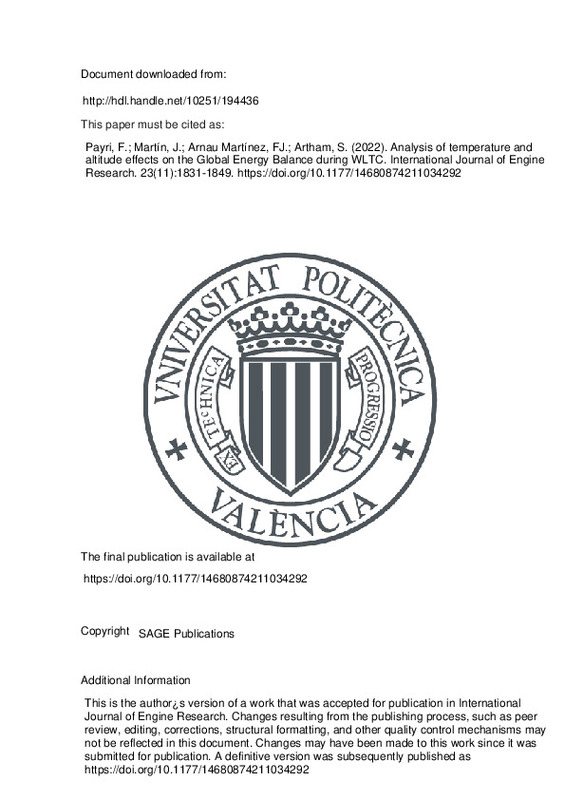JavaScript is disabled for your browser. Some features of this site may not work without it.
Buscar en RiuNet
Listar
Mi cuenta
Estadísticas
Ayuda RiuNet
Admin. UPV
Analysis of temperature and altitude effects on the Global Energy Balance during WLTC
Mostrar el registro sencillo del ítem
Ficheros en el ítem
| dc.contributor.author | Payri, Francisco
|
es_ES |
| dc.contributor.author | Martín, Jaime
|
es_ES |
| dc.contributor.author | Arnau Martínez, Francisco José
|
es_ES |
| dc.contributor.author | Artham, Sushma
|
es_ES |
| dc.date.accessioned | 2023-06-20T18:01:57Z | |
| dc.date.available | 2023-06-20T18:01:57Z | |
| dc.date.issued | 2022-11 | es_ES |
| dc.identifier.issn | 1468-0874 | es_ES |
| dc.identifier.uri | http://hdl.handle.net/10251/194436 | |
| dc.description | This is the author¿s version of a work that was accepted for publication in International Journal of Engine Research. Changes resulting from the publishing process, such as peer review, editing, corrections, structural formatting, and other quality control mechanisms may not be reflected in this document. Changes may have been made to this work since it was submitted for publication. A definitive version was subsequently published as https://doi.org/10.1177/14680874211034292 | es_ES |
| dc.description.abstract | [EN] In this work, the Global Energy Balance (GEB) of a 1.6 L compression ignition engine is analyzed during WLTC using a combination of experimental measurements and simulations, by means of a Virtual Engine. The energy split considers all the relevant energy terms at two starting temperatures (20 degrees C and 7 degrees C) and two altitudes (0 and 1000 m). It is shown that reducing ambient temperature from 20 degrees C to -7 degrees C decreases brake efficiency by 1% and increases fuel consumption by 4%, mainly because of the higher friction due to the higher oil viscosity, while the effect of increasing altitude 1000 m decreases brake efficiency by 0.8% and increases fuel consumption by 2.5% in the WLTC mainly due to the change in pumping. In addition, GEB shows that ambient temperature is affecting exhaust enthalpy by 4.5%, heat rejection to coolant by 2%, and heat accumulated in the block by 2.5%, while altitude does not show any remarkable variations other than pumping and break power. | es_ES |
| dc.description.sponsorship | The author(s) disclosed receipt of the following financial support for the research, authorship, and/or publication of this article: This research has been partially funded by the European Union's Horizon 2020 Framework Programme for research, technological development and demonstration under grant agreement 723976 ("DiePeR'') and by the Spanish government under the grant agreement TRA2017-89894-R ("MECOEM'') and Sushma Artham was supported by FPI grant with reference PRE2018-084411. The authors wish to thank Renault SAS, especially P. Mallet and E. Gaiffas, for supporting this research. | es_ES |
| dc.language | Inglés | es_ES |
| dc.publisher | SAGE Publications | es_ES |
| dc.relation.ispartof | International Journal of Engine Research | es_ES |
| dc.rights | Reserva de todos los derechos | es_ES |
| dc.subject | Transient | es_ES |
| dc.subject | Global Energy Balance | es_ES |
| dc.subject | Virtual Engine | es_ES |
| dc.subject | WLTC | es_ES |
| dc.subject | Cold-start | es_ES |
| dc.subject | Altitude | es_ES |
| dc.subject | Ambient | es_ES |
| dc.subject.classification | MAQUINAS Y MOTORES TERMICOS | es_ES |
| dc.title | Analysis of temperature and altitude effects on the Global Energy Balance during WLTC | es_ES |
| dc.type | Artículo | es_ES |
| dc.identifier.doi | 10.1177/14680874211034292 | es_ES |
| dc.relation.projectID | info:eu-repo/grantAgreement/AEI/Plan Estatal de Investigación Científica y Técnica y de Innovación 2013-2016/TRA2017-89894-R/ES/METODOLOGIA PARA LA PREDICCION DE EMISIONES DE CO2 Y CONTAMINANTES DE UN MOTOR ALTERNATIVO/ | es_ES |
| dc.relation.projectID | info:eu-repo/grantAgreement/AEI//PRE2018-084411//AYUDA PARA CONTRATOS PREDOCTORALES PARA LA FORMACION DE DOCTORES-ARTHAM, SUSHMA. PROYECTO: METODOLOGIA PARA LA PREDICCION DE EMISIONES DE CO2 Y CONTAMINANTES DE UN MOTOR ALTERNATIVO/ | es_ES |
| dc.relation.projectID | info:eu-repo/grantAgreement/EC/H2020/723976/EU | es_ES |
| dc.rights.accessRights | Abierto | es_ES |
| dc.contributor.affiliation | Universitat Politècnica de València. Escuela Técnica Superior de Ingenieros Industriales - Escola Tècnica Superior d'Enginyers Industrials | es_ES |
| dc.contributor.affiliation | Universitat Politècnica de València. Escuela Técnica Superior de Ingeniería del Diseño - Escola Tècnica Superior d'Enginyeria del Disseny | es_ES |
| dc.description.bibliographicCitation | Payri, F.; Martín, J.; Arnau Martínez, FJ.; Artham, S. (2022). Analysis of temperature and altitude effects on the Global Energy Balance during WLTC. International Journal of Engine Research. 23(11):1831-1849. https://doi.org/10.1177/14680874211034292 | es_ES |
| dc.description.accrualMethod | S | es_ES |
| dc.relation.publisherversion | https://doi.org/10.1177/14680874211034292 | es_ES |
| dc.description.upvformatpinicio | 1831 | es_ES |
| dc.description.upvformatpfin | 1849 | es_ES |
| dc.type.version | info:eu-repo/semantics/publishedVersion | es_ES |
| dc.description.volume | 23 | es_ES |
| dc.description.issue | 11 | es_ES |
| dc.relation.pasarela | S\482467 | es_ES |
| dc.contributor.funder | AGENCIA ESTATAL DE INVESTIGACION | es_ES |
| dc.contributor.funder | COMISION DE LAS COMUNIDADES EUROPEA | es_ES |







![[Cerrado]](/themes/UPV/images/candado.png)

